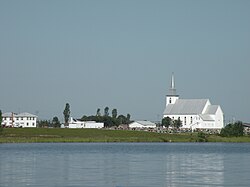Pokemouche, New Brunswick
| Pokemouche | |
|---|---|
| Local Service District | |
 |
|
| Coordinates: 47°40′23″N 64°52′45″W / 47.67305556°N 64.87916667°W | |
| Country |
|
| Province |
|
| region | Acadian peninsula |
| County | Gloucester |
| Founded | 1812 |
| Constitution | 1984 |
| Founded by | Gilbert Duke, John Tophem |
| Area | |
| • Total | 22.79 km2 (8.80 sq mi) |
| Elevation | 23 m (75 ft) |
| Population (2011 |
|
| • Total | 518 |
| • Density | 23/km2 (60/sq mi) |
| Demonym(s) | Pokemouchois or Pokemouchian |
| language | |
| Time zone | AST (UTC-4) |
| • Summer (DST) | ADT (UTC-3) |
| Area code(s) | +1-506 |
| georeference | 130110 |
| places of interest | Pokemouche River |
Pokemouche (IPA : /pɔkmuʃ/) is a Canadian local service district in Gloucester County, in the northeast of New Brunswick, in the Acadian peninsula.
Despite its population of only 518 inhabitants, the LSD plays an important role in transportation, the economy and culture of the region, and it is the site of several major projects.
The area around Pokemouche has been occupied for at least four thousand years by the Paleo-Indians, and for at least 3,000 years by Mi'kmaq people, who now have a settlement at the Burnt Church First Nation.
The current village was founded in 1812. Its main industry was originally forestry, but agriculture, as well as tourism centred on the Pokemouche River, now make up most of the local economy. A revival of the textile industry is also being considered.
The name “Pokemouche” comes from the Mi'kmaq language word “Pokomújpetúák” in the Francis-Smith orthography, pronounced o [p], (Pogomu’jpetu’a’g in the Listuguj orthography, Pokomu:jpetu:a:k in the orthography of the Lexicon, Pogomotjpetoag in the Pacific orthography and Pokŭmooch'-petooāāk in the Rand orthography. According to sources this word could mean salt water entrance,lots of fish or ground of abundance. The name was first mentioned in 1685 with the spelling Pakmouch, on a geographical chart of the Emanuel Jumeau recollects mission, based at the time in Miramichi. This was followed by Poquemouche (Bellin, 1744 et Mitchell, 1755), Pokemushi (Jefferys, 1755, Smethurst, 1755), Bamush (DesBarres, 1778), Pockmouche (Coney, 1832 et Saunders, 1852) and Pokamouche (Gesner, 1847). The current orthography appeared in 1852 (Perley). The common name of the village used to be upper Pokemouche while the village of Inkerman was called lower Pokemouche, in reference to the respective positions of these villages along the Pokemouche River.
...
Wikipedia
